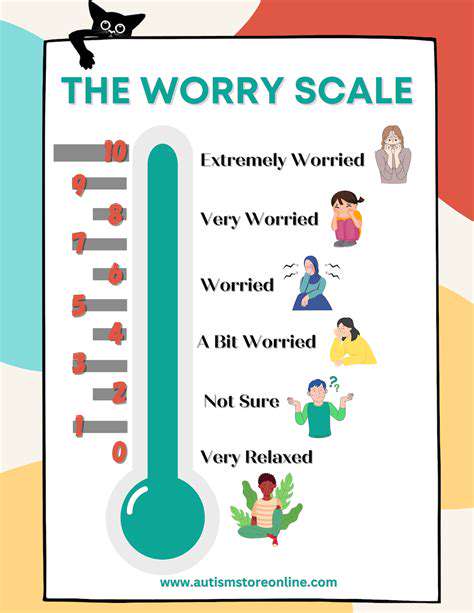How Health Anxiety Can Affect Your Quality of Life
The Physical Toll of Constant Worry

The Impact on Sleep
Constant worry can significantly disrupt sleep patterns, leading to insomnia and difficulty falling asleep. This lack of restorative sleep can have cascading effects on physical health, impacting energy levels, mood, and cognitive function. Chronic sleep deprivation weakens the immune system, making individuals more susceptible to illness. Poor sleep quality can also contribute to weight gain and exacerbate existing health conditions.
The racing thoughts and anxieties that accompany constant worry often make it difficult to quiet the mind before bed. This mental agitation can manifest as tossing and turning, leading to a frustrating cycle of disrupted sleep and increased stress.
The Strain on the Cardiovascular System
Prolonged periods of worry have been linked to elevated blood pressure and heart rate. The constant stress response, characterized by the release of hormones like cortisol and adrenaline, puts a significant strain on the cardiovascular system. This can lead to an increased risk of heart disease, stroke, and other cardiovascular complications over time. It's crucial to recognize the subtle but significant impact of stress on heart health.
The Digestive System's Response
Anxiety and worry can manifest as digestive issues, such as stomach aches, nausea, and diarrhea. The digestive system is deeply intertwined with the nervous system, and stress signals can trigger these uncomfortable symptoms. This physiological response highlights the interconnectedness of mental and physical well-being. Chronic stress can also lead to ulcers and other more severe gastrointestinal problems.
Many individuals experience digestive upset as a direct result of constant worry. This can range from mild discomfort to more debilitating conditions, underscoring the importance of addressing underlying anxieties.
Muscle Tension and Pain
Constant worry often leads to chronic muscle tension, particularly in the neck, shoulders, and back. This tension can manifest as headaches, stiffness, and even chronic pain. The body's natural response to stress involves muscle contraction, and prolonged worry can perpetuate this response. This physical manifestation of mental strain highlights the need for relaxation techniques and stress management strategies.
Weakened Immune System
Chronic stress and worry can impair the immune system's ability to function effectively. The constant release of stress hormones suppresses the immune response, making individuals more susceptible to infections and illnesses. This compromised immune system can prolong recovery times and increase the risk of developing various health problems. This is a critical aspect of the physical toll of constant worry, often overlooked but deeply impactful.
Impact on Mental Health
The physical toll of constant worry isn't limited to the body; it significantly impacts mental well-being. Chronic stress can contribute to the development of anxiety disorders, depression, and other mental health conditions. This illustrates the crucial link between mental and physical health and the importance of addressing both aspects of well-being. Identifying and managing worry is essential for maintaining overall health.
The Role of Inflammation
Constant worry can contribute to chronic inflammation throughout the body. Inflammation, while a natural bodily response, can become detrimental when prolonged. This sustained inflammatory state can contribute to a range of health issues, including cardiovascular disease, autoimmune disorders, and certain types of cancer. Chronic inflammation is a significant concern linked to long-term worry and stress. Adopting healthy coping mechanisms is essential to mitigate this risk.
Living a Fulfilling Life Despite Health Anxiety

Embracing Imperfection
Striving for a fulfilling life often involves a relentless pursuit of perfection, but this relentless pursuit can be counterproductive. Instead of aiming for an unattainable ideal, embrace the imperfections that make you uniquely you. Acknowledging and accepting your flaws is the first step toward self-acceptance and a more authentic existence. This doesn't mean ignoring personal growth; rather, it means focusing on progress, not perfection.
Learning to accept yourself for who you are, flaws and all, is a crucial step toward a more joyful and meaningful life. It allows you to cultivate self-compassion and build a stronger sense of self-worth, which are essential for navigating the challenges and triumphs that life inevitably throws your way. Perfectionism often leads to disappointment and self-criticism, which can hinder your overall well-being.
Prioritizing Meaningful Connections
Genuine connections with others are vital for a fulfilling life. Nurturing relationships with family, friends, and community members provides a sense of belonging and support. These connections offer a network of individuals who understand you and celebrate your successes, while also offering support during challenging times. Investing time and effort in these connections is an investment in your overall happiness and well-being.
Meaningful connections are about more than just superficial interactions. They involve deep understanding, empathy, and genuine care for the well-being of those around you. These bonds provide a foundation for a supportive environment, fostering personal growth and a sense of purpose.
Discovering Your Passions
Identifying and pursuing your passions is essential for a fulfilling life. When you engage in activities that truly resonate with you, you experience a sense of joy and purpose. This can be anything from creative endeavors to helping others, or simply spending time in nature. Exploring different avenues and interests is key to discovering what truly ignites your soul.
This exploration will not only enrich your life but also provide a sense of fulfillment and purpose. By understanding what truly excites and motivates you, you can unlock your potential and live a life that aligns with your values and aspirations.
Cultivating Gratitude
Practicing gratitude is a powerful tool for enhancing your overall well-being and experiencing a fulfilling life. Regularly acknowledging the positive aspects of your life, no matter how small, can significantly impact your perspective. This can range from appreciating the simple pleasures of life to recognizing the kindness of others. Taking time to express gratitude can shift your focus from what's lacking to what's present.
Gratitude fosters a sense of contentment and appreciation, which are crucial components of a happy and fulfilling life. Focusing on the good in your life, no matter how small, can have a profound impact on your overall happiness and well-being. This practice can lead to increased optimism and a more positive outlook.
Setting Realistic Goals
Setting realistic goals is crucial for maintaining motivation and preventing feelings of overwhelm. Unrealistic expectations can lead to frustration and disappointment, hindering your progress toward a fulfilling life. Break down large goals into smaller, more manageable steps. This approach fosters a sense of accomplishment and encourages continued progress.
Setting realistic goals involves understanding your limitations and capabilities. It also involves recognizing that progress takes time and effort. By setting achievable goals, you create a pathway toward success and fulfillment without succumbing to the pressure of unrealistic expectations.
Embracing Mindfulness
Practicing mindfulness involves focusing on the present moment without judgment. By cultivating awareness of your thoughts, feelings, and surroundings, you can gain a deeper understanding of yourself and your experiences. This practice can help you navigate stress and anxiety more effectively, fostering a greater sense of calm and peace.
Mindfulness allows you to appreciate the present moment, reducing the tendency to dwell on the past or worry about the future. It allows you to live more fully in the present, increasing your ability to savor the experiences that life offers.
Seeking Professional Support
Sometimes, navigating the complexities of life requires support from a professional. Seeking guidance from a therapist or counselor can provide valuable tools and strategies for managing challenges and promoting well-being. Seeking support is a sign of strength, not weakness. A trained professional can offer objective insights and personalized strategies to address specific needs and concerns.
Professional support can provide a safe space to explore emotions, develop coping mechanisms, and address any underlying issues that may be impacting your overall well-being and ability to live a fulfilling life. Don't hesitate to reach out if you feel you could benefit from additional support and guidance.